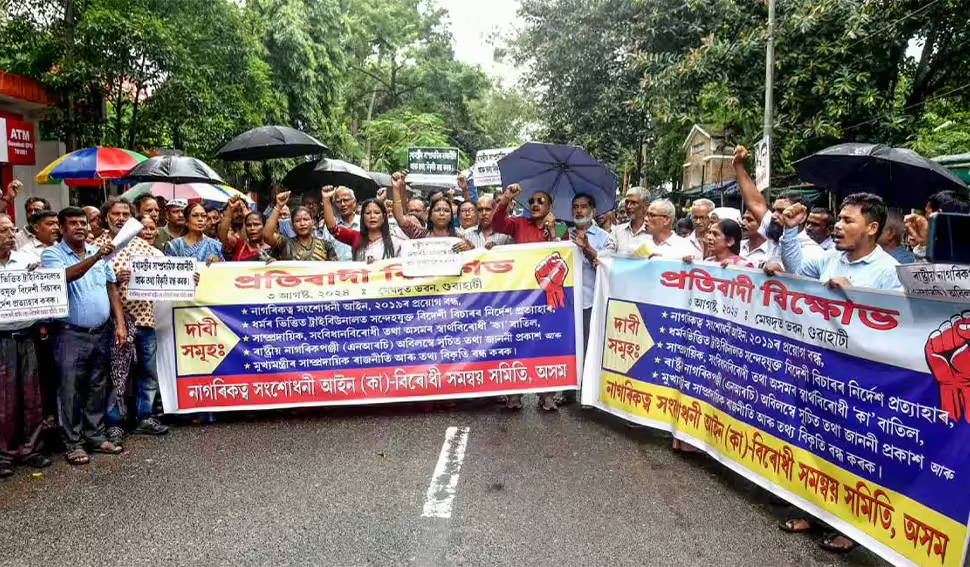Assam oppn parties hail SC verdict, bat for CAA repeal

Opposition parties in Assam, particularly the Congress and Assam Jatiya Parishad (AJP), have welcomed the Supreme Court’s verdict on Thursday that upheld the validity of Section 6A of the Citizenship Act.
This verdict resolved a long-standing debate over the cut-off year for detecting and deporting illegal immigrants in Assam, affirming that the date remains March 24, 1971, as per the Assam Accord.
Reacting to the Supreme Court’s verdict, opposition leader Debabrata Saikia expressed his approval, calling it a “historic” moment. He noted that the decision finally ends the long-standing speculation over the cut-off date for the detection and deportation of illegal foreigners in Assam. Saikia emphasized that this ruling reaffirms the validity of the 1971 cut-off date established by the Assam Accord.
He also praised the Congress government’s role in addressing the issue of illegal immigration in Assam, particularly acknowledging the leadership of former Prime Minister Rajiv Gandhi. Saikia remarked that the verdict proves that the then Congress governments—both in Assam and at the Centre—made a timely and decisive move to resolve the problem of illegal influx through the Assam Accord, which was signed in 1985.
Assam Congress chief Bhupen Kumar Borah highlighted the apex court’s reaffirmation of the Assam Accord, emphasizing its significance in addressing illegal immigration.
Borah stated that the court’s decision serves as a reminder of the state’s responsibility to uphold the terms of the Accord, under which all individuals who entered Assam illegally after March 24, 1971, must be identified and deported.
He reiterated that the Congress party has consistently honoured the Assam Accord and is committed to fulfilling its provisions.
Following the SC verdict, Congress MP Gaurav Gogoi expressed his respect for the ruling on social media platform X (formerly Twitter). Gogoi called the Assam Accord a “historic accord” that helped bring peace to Assam after years of political unrest and agitation. He praised former Prime Minister Rajiv Gandhi for his willingness to engage with student leaders, despite political differences, during the time of the Accord’s negotiation.
Gogoi contrasted this approach with the current political climate under the BJP government, criticizing the ruling party for its attitude toward protestors. He noted that today, BJP labels protestors as “anti-nationals” or “Khalistanis.” Gogoi also took a swipe at Prime Minister Narendra Modi, accusing him of ignoring states like Manipur, referencing the ongoing crisis there, and stating that Modi “pretends as if the state doesn’t exist.”
The Assam Jatiya Parishad (AJP) has appreciated the SC ruling and said the verdict reaffirms the Assam Accord’s cut-off year for citizenship as 1971, and demonstrates the BJP’s misleading stance on deporting foreigners.
The verdict also nullifies the Citizenship Amendment Act, making it an unconstitutional act. The AJP calls for the government to take action.
in a press statement, AJP president Lurinjyoti Gogoi and general secretary, Jagadish Bhuyan described the verdict as realistic, timely, and farsighted.
In their statement, Gogoi and Bhuyan said, “With this ruling, the constitutional validity of the Assam Accord has been reaffirmed. The justice of our long-standing position, that the cut-off year for citizenship should be 1971, has been proven. It also demonstrates that the BJP’s stance on deporting foreigners is misleading and self-serving.”
Referring to the ruling’s implication for the Citizenship Amendment Act (CAA), Gogoi and Bhuyan noted, “The court has made it clear that anyone who entered Assam illegally after March 24, 1971, is an illegal immigrant. This clearly nullifies the legal validity of the CAA. In essence, the court has re-established that the CAA is unconstitutional, and repealing it has now become a duty.”
The Assam Anuchuchita Jati Yuba Chatra Parishad (AJYCP), a prominent student organization, also welcomed the Supreme Court’s verdict upholding Section 6A of the Citizenship Act. In their reaction, AJYCP hailed the decision as a victory for Assam and the preservation of the state’s demographic balance.
Following the verdict, AJYCP went a step further by demanding the government roll back the Citizenship Amendment Act (CAA). The organization argued that while the Supreme Court’s ruling affirms the Assam Accord’s cut-off date for the detection and deportation of illegal foreigners (March 24, 1971), the CAA contradicts this by allowing citizenship for certain migrants who arrived after the cut-off date. AJYCP views the CAA as undermining the essence of the Assam Accord and posing a threat to the indigenous population of Assam.

Leave a Reply